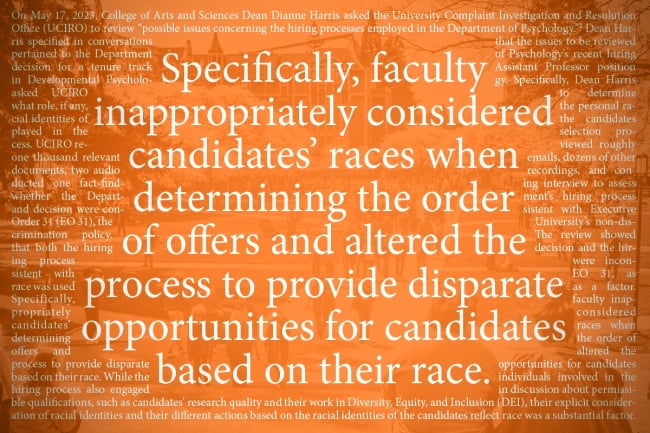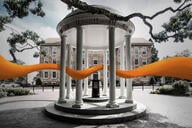You have /5 articles left.
Sign up for a free account or log in.

The University of Washington released its report on inappropriate use of race in hiring this week.
Justin Morrison/Inside Higher Ed | University of Washington | Getty Images
The hiring process for a University of Washington psychology professor position titled “Diversity in Development” initially ranked a white person No. 1 out of 84 applicants, the university says in a report released this week.
But psychology department faculty members then pressured one another until the third-ranked finalist, who was Black, was given this tenure-track assistant professor job, above the white and Asian finalists, the document states. It adds that it’s unclear how candidates’ racial identities were assigned. The assistant professor accepted the job in April of this year.
The investigation, which the university posted online Tuesday, concludes that “race was used as a substantial factor in the selection of the final candidate and the hiring process,” violating a university executive order that bans considering race in hiring. Though the report itself doesn’t conclude state law was violated, university spokesman Victor Balta noted in an email to Inside Higher Ed Thursday that Washington citizens, in 1998, passed a referendum banning affirmative action in public colleges and universities.
The university announced on its website that the psychology department is now “barred from conducting searches for tenured and tenure-track faculty positions” for at least two years, “subject to review by the Provost’s Office.” It also said the department will “undergo a comprehensive review and revision of its hiring processes,” and all department members “will receive training on how to conduct searches consistent with law and policy.”
“The University is taking personnel action to address individual actions,” the institution stated. “These proceedings are confidential.”
The report, which redacts all the names of those involved, suggests that faculty members tried to hide the extent to which race was considered, including in the hiring report.
“I advise deleting the statement below as it shows that URM [underrepresented minority] applications were singled out and evaluated differently than non-URM applications (which is not allowed as [redacted] noted),” one email read, according to the report.
At a faculty meeting, someone whose name is redacted “informed faculty that the Hiring Committee had three outstanding candidates and so they used DEI to distinguish and select a first offer,” the report says, citing an audio recording.
The report says no definition of “DEI” was heard, but other documents indicate the working definition “is operationalized as focusing on increasing hiring” of underrepresented minority candidates. In the audio, a faculty member questions how the decision complies with the 1998 referendum, and faculty members were then told “nothing illegal occurred,” the report says.
Before finalists were narrowed to three, five finalists were invited to virtual visits, with the schedules including meetings with the Women Faculty and Faculty of Color groups. But a member of the latter group expressed opposition to meeting the white candidates.
“As a person who has been on both sides of the table for these meetings, I have really appreciated them,” the unnamed person wrote in an email. “Buuut, when the candidate is White, it is just awkward. The last meeting was uncomfortable, and I would go as far as burdensome for me. Can we change the policy to not do these going forward with White faculty?”
An unnamed person wrote in another email, in March, that they were inclined to hold the meetings just for faculty candidates of color.
“I’m also mindful that our Provost is now getting anxious about anything that’s directed to only some identity groups (i.e., they are getting worried about fallout from the pending Supreme Court affirmative action rulings),” this person wrote in an email. “My read is that they’ll get fearful of litigation and overcorrect into colorblindness. Maybe our committee can preemptively think our way around this type of future directive.”
Prominent in the situation was the department’s Diversity Advisory Committee, which formed in 2020 and has been involved in seven faculty searches, the report says. The university’s website currently says, in its section on that committee, that the department “hired five Faculty of Color to the tenure track during the 2020–21 academic year (one joined with tenure), three with endowed term professorships generated by department advancement efforts.”
The Diversity Advisory Committee uses an unadopted “case study” as department policy, and that case study involves monitoring the racial identity of candidates through all phases of the hiring process and purports to require the hiring committee to get the Diversity Advisory Committee’s endorsement. An unnamed person said not voting on the case study was intentional because “we felt we needed it strategically and didn’t want to put diversity values up for debate.”
The university announced the case study “will no longer be used in hiring processes."
John Sailer, a senior fellow at the National Association of Scholars, a membership organization and think tank that’s concerned about racial preferences and diversity, equity and inclusion, submitted a public records request about the situation in April. The report says that Dianne Harris, dean of the College of Arts and Sciences, asked what’s now called the university’s Civil Rights Investigation Office to investigate the next month.
Balta wrote to Inside Higher Ed that there “was an internal whistleblower who brought this issue to the University’s attention before John Sailer’s public records request, and there is an email dated April 3 back to the whistleblower confirming awareness of the situation. There were conversations over the next several weeks regarding the most appropriate way to proceed.”
“The UW is committed to doing what is right and was responding based on the initial whistleblower’s information and concerns, not based on inquiries or interest from any external advocacy group,” Balta wrote.
The university still hasn’t given the National Association of Scholars the documents it requested. Balta wrote that “this request was quite comprehensive, requiring significant review and redaction considerations. It is still in progress. Mr. Sailer now has seven active records requests and these, again, are generally processed on a first-in, first-out basis.”
Sailer said Thursday that he thinks “racial preferences cause people to prioritize things that are other than what these roles were created for, and I think it’s a bad move when institutions try to hire on the basis of race” rather than excellence in “a given domain.”
He added that “sometimes it seems that faculty search committees will just treat DEI statements as functionally a proxy for race, and I think that’s worth keeping in mind in the broader debate over DEI statements.”




